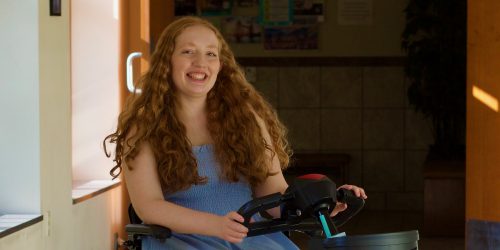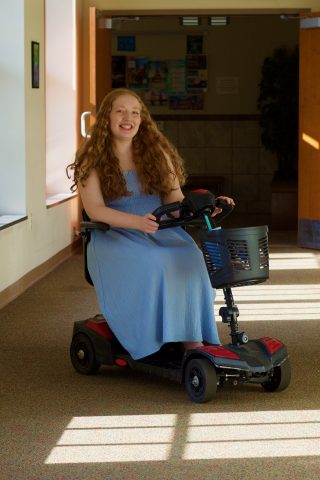
My disability, muscular dystrophy, affects my mobility though I can walk some distances. I always knew I would be able to go to college but would need a mobility aid wherever I attended. I was a little nervous and embarrassed when I first got my mobility scooter.
Of course, I learned how bad I am at math, how to know which professors are the most helpful, and how many minutes to leave before the rush at the end of an event. But living with a disability has taught me much more: how to be resilient, how to be a voice for myself and others, and how to make sure I am heard.
My disability, muscular dystrophy, affects my mobility though I can walk some distances. I always knew I would be able to go to college but would need a mobility aid wherever I attended. I was a little nervous and embarrassed when I first got my mobility scooter. Sure, I had been a disabled individual all my life, but having a mobility scooter in college felt like I had a big sign saying, “I’m disabled.” I was worried people wouldn’t be willing to get to know me because of this giant elephant (or scooter) in the room. It would be another barrier that I would need to face. Little did I know that my mobility scooter would become my superpower.
Due to my scooter’s sleek look, many folks on campus began to know me as “the girl on the scooter.” It became my identifier: the redhead with the red scooter. And the funny thing is, I am proud of that. I go much faster than anyone else walking on the sidewalk. I can zip and zoom in and out of buildings. I get to my classes in record time and can race anyone to a bustling event or food pop-up. I had always been comfortable with having a disability, but having this scooter has given me a new sense of acceptance and advocacy. It gave me the confidence I needed to succeed. My challenges do not have to limit what I can accomplish. In fact, they’ve helped me solve problems.
I’ve been able to educate people on other types of disabilities, as well as my own. My existence on this campus provided the opportunity for dialogue on how to better include people with mobility challenges. When you aren’t personally encountering a barrier, you don’t think about it. But I’ve challenged myself and others to think about things that don’t personally affect us. Others may not think about how I access a building that wasn’t designed for people with disabilities, but I have to think about it every day. My projects have included advocating for accessibility maps to be available online and creating an accessibility guide for the Andreasen Center for Wellness.
Throughout my time here, I have trusted that God will help me find a way to be accommodated. I have also trusted that He will help others in our faith community see the importance of accommodations for all people. If we are taught to love and help others, that also means individuals with disabilities. When faced with challenges, whether accessibility or other barriers, it is an opportunity for us to work together to ensure the difficulty is overcome.
My little scooter has made its mark on campus and has allowed me to do the same. One of the most important things I’ve learned is that it is okay to ask for help. Whether opening doors or helping with advocacy and education, God has shown me the power that can come in asking for assistance. I do not have to roll through this life alone.

Alexandria “Lexie” Dunham graduated from Andrews University this spring with a psychology degree. She hopes to pursue graduate studies in clinical mental health counseling.